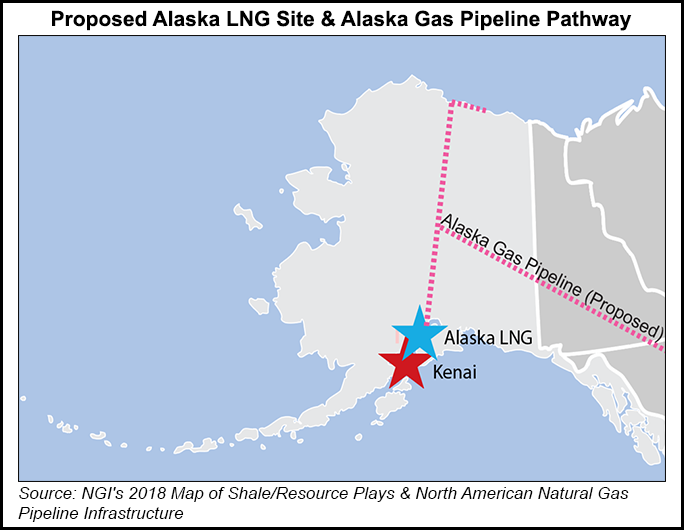NGI All News Access | Infrastructure | LNG
Alaska Federation of Natives Passes Resolution in Support of State’s LNG Project
The Alaska Federation of Natives (AFN), the largest native organization in Alaska, unanimously passed a resolution in support of plans to build a liquefied natural gas (LNG) project in the state.

During a plenary session at AFN’s annual convention on Saturday, the organization adopted the resolution in support of the $43.4 billion Alaska LNG project, which as designed could export up to 20 million metric tons/year (mmty) from Alaska’s North Slope. The project is led by the Alaska Gasline Development Corp. (AGDC), a public corporation.
The resolution, sponsored by four native corporations — Arctic Slope Regional Corp. (ASRC), Cook Inlet Region Inc. (CIRI), Doyon Ltd. and Ahtna Inc. — calls for AFN to work with AGDC “to ensure cooperation between Alaska natives and their respective economic interests to provide to AGDC subject matter expertise and support services to advance” an Alaska gasline project.
“Having the state’s leading native organizations voice their support for an Alaska gasline is a significant addition to the growing coalition backing our efforts to commercialize one of the state’s most valuable natural resources,” said AGDC Director of Alaska Native Affairs Donna Bach. “AFN represents Alaska’s rich ethnic and cultural groups and interests, and we are grateful for their interest and support of our work to unlock our gas resources for the benefit of all Alaskans.”
AFN’s membership includes 186 federally recognized tribes, 177 village corporations, 12 regional corporations, and 12 regional nonprofit and tribal consortiums.
As designed, Alaska LNG includes a three-train liquefaction plant in Southcentral Alaska at Nikiski, an 807-mile, 1.1 meter diameter gas pipeline, a North Slope gas treatment plant, and interconnecting facilities to connect the Prudhoe Bay gas complex to the gas treatment plant. The project would traverse lands managed by ASRC, CIRI, Doyon and Ahtna.
Earlier this month, three Chinese companies that agreed to finance the Alaska LNG project signed a supplemental agreement for their continued participation, despite souring Sino-U.S. ties on trade.
© 2024 Natural Gas Intelligence. All rights reserved.
ISSN © 1532-1231 | ISSN © 2577-9877 |
